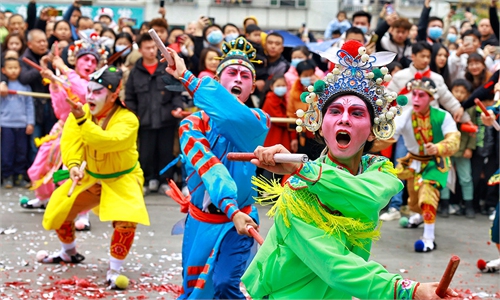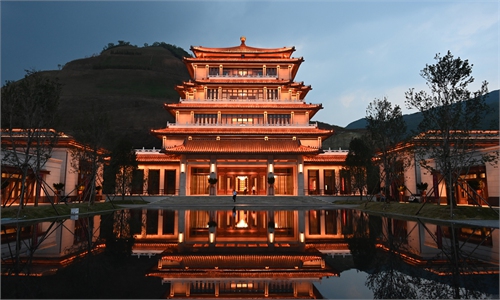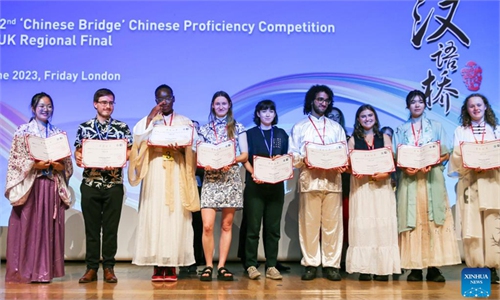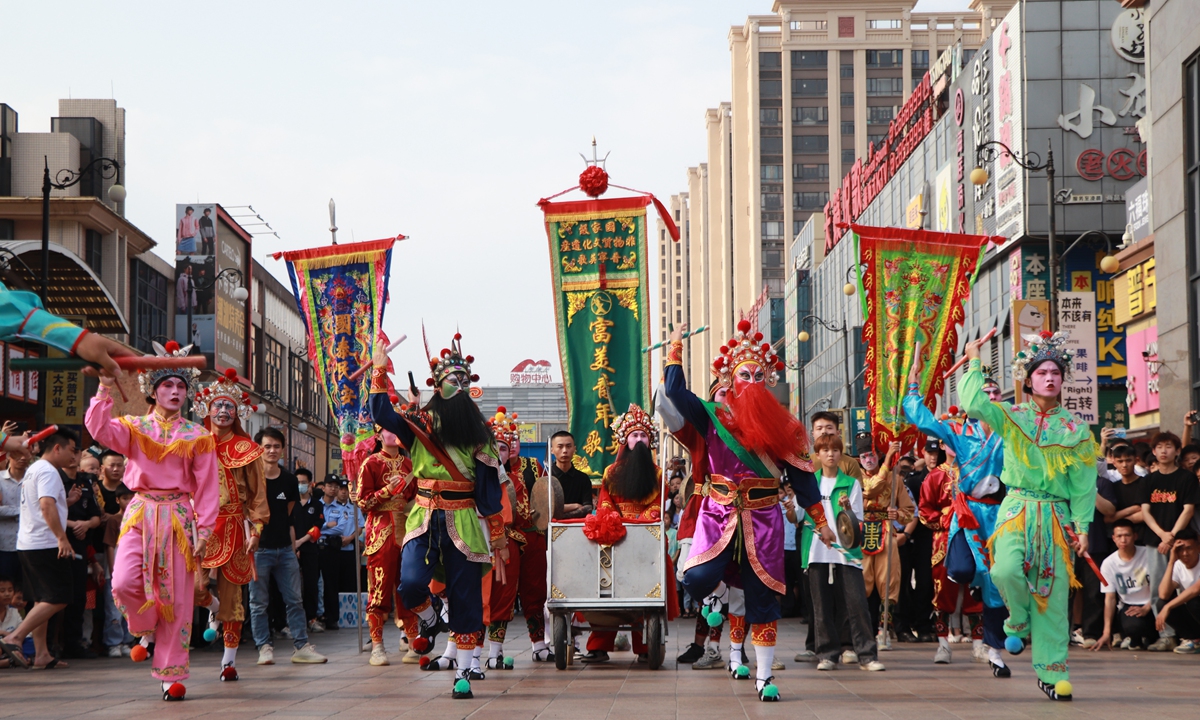
Yingge dancers perform in Puning, Guangdong Province. Photo: Courtesy of Deng Yao
In mid-June, two special groups established a unique friendship as Yingge dancers from both China and Thailand met in Phanat Nikhom, Thailand, for the very first time since the traditional dance took root in Thailand nearly 100 years ago.
Yingge dance, literally the Songs of Heroes dance, is a traditional folk dance that originated from the Chaoshan area of South China's Guangdong Province. Based on the stories of the 108 heroes of Liangshan Mountain from the classic novel Outlaws of the Marsh, Yingge combines elements of opera, dance and martial arts.
As the dance is usually performed during festivals and celebrations, dancers tend to wear colorful costumes and props such as masks, snakes, spears and drums as they perform acrobatic movements and stunts.
With a history of over 300 years in Chaoshan, the dance was brought by a pioneer to Thailand over 100 years ago, after which it adapted to the local culture and customs.
Li Junhao, coach of a well-known Yingge dance troupe in Puning, Guangdong, took part in the June cultural exchange event in Thailand. This was the first time he had traveled to Thailand as well as the first time he got a close-up look at Thai Yingge dance.
"It was an incredible experience going there," Li told the Global Times.
"Actually, we had longed to meet the Thai dancers ever since I heard that Yingge dance has been well preserved in another country. It's just that we never had the chance to go until this month," he added.
Li's team, the Fumei Yingge Dance Troupe, has gained popularity on social media through countless videos of their performances posted online since the 2023 Spring Festival.
This meeting could never have taken place without the efforts of one person - Deng Yao, a legal expert and member of the Guangdong Intangible Cultural Heritage Protection Expert Committee.
"It never occurred to me that Yingge dance would be so vital in Thailand as it originally was a folk dance from Guangdong. But in Thailand, it has become not only a culture for local ethnic Chinese, but also a source of pride for all local people," Deng said.
Trying to connect
Back in January, large crowds of visitors could be seen in Jiexi county, Guangdong, as they watched Yingge dancers perform as part of celebrations for the Spring Festival. The colorful costumes and the high-pitched background music lifted the atmosphere on the street to the highest point.
After learning of the existence of Yingge dance in Thailand, Deng went all the way to the country, where he was stunned to see similar crowds like in China.
In March, crowds moved to the rhythm of loud drums while a Yingge dance troupe of over 40 artists demonstrated their abilities at a retail center to mark the Chinese New Year in eastern Thailand's Phanat Nikhom district.
Seeing how the culture of his mother country had taken root in Thailand, the determination to allow the troupes of both countries to meet each other gradually grew into Deng's heart.
"I proposed the plan to the Guangdong troupes several times and tried to invite them over to Thailand, but sadly things didn't work out due to the pandemic. It wasn't until this month that we finally met," Deng recalled to the Global Times.
Deng noted that this folk dance symbolizes the hard work and courageous spirit of the Chaoshan people.
"'How did you fall in love with Yingge at the beginning?' This is a question that I asked a lot to the young dancers when I conducted my field trip in Thailand. Besides those ethnic Chinese who learned from their parents, others tended to answer the question saying they were deeply influenced by the solemn ceremony and heroism of Yingge dance when they were young," said Deng.
Expectations for the future
"I hope I can go to China one day," one young Yingge dancer from Thailand named Chok told the Global Times.
"Not only for Yingge dance, I hope to have a taste of the gourmet food there," he said.
Chok recalled that at the very beginning, his parents wanted him to practice Yingge for his health, but quickly it became part of his everyday life.
As members of the Belt and Road Initiative, the two countries have conducted a string of cultural activities with each other over the past few years, ranging from art exhibitions to music concerts.
But for Deng, Yingge dance can be seen as a new way to boost cultural exchanges at the people-to-people level.
The Yingge dance troupe from the city of Udon Thani is another strong branch practicing the folk art in Thailand. Deng recalled that the Udon Thani troupe grew extremely excited when he told them of his plans for cultural exchanges.
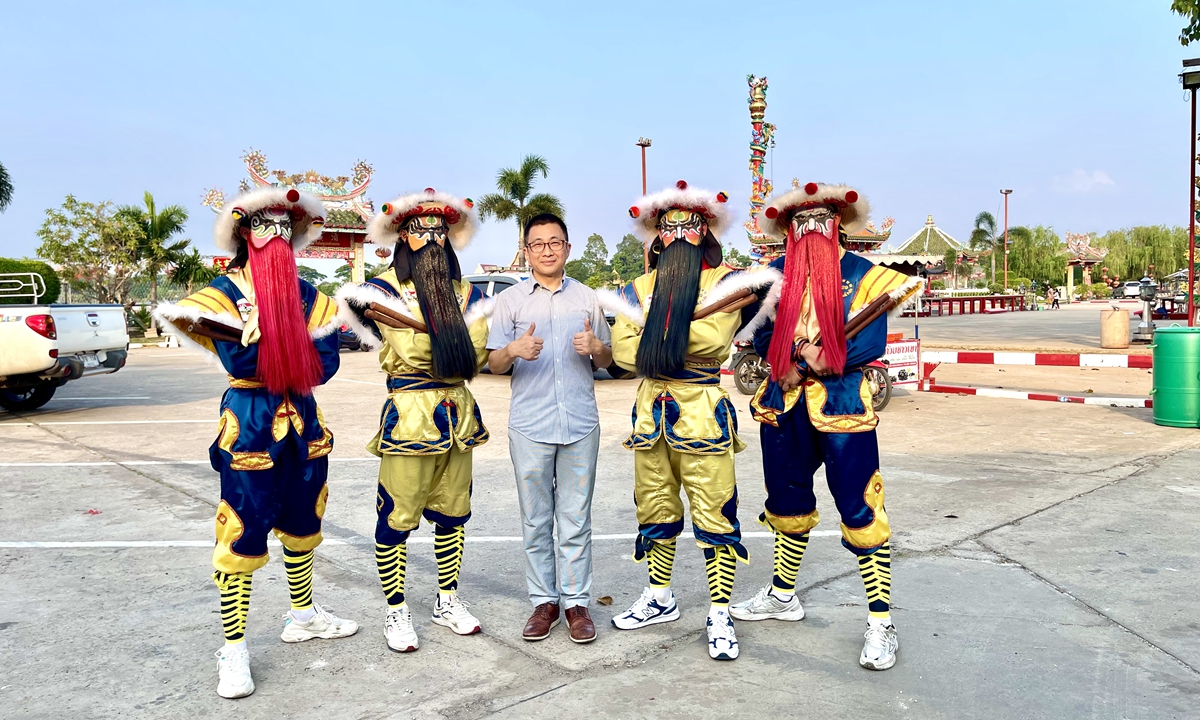
Deng Yao (center) takes a photo with members of the Yingge dance troupe from the Thai city of Udon Thani. Photo: Courtesy of Deng Yao
Vijai Amaralikit, mayor of Phanat Nikhom, told the Global Times that ever since Yingge dance took root in Thailand, a deep cultural bond has existed between different ethnic groups here through the dance.
"We have different ethnic groups here in town, but Yingge dance has been able to get them to mix together through cultural events," Amaralikit said.
"We expect to carry out more exchanges in the future and hope that Chinese troupes are able to come to Thailand for festival performances next year."
